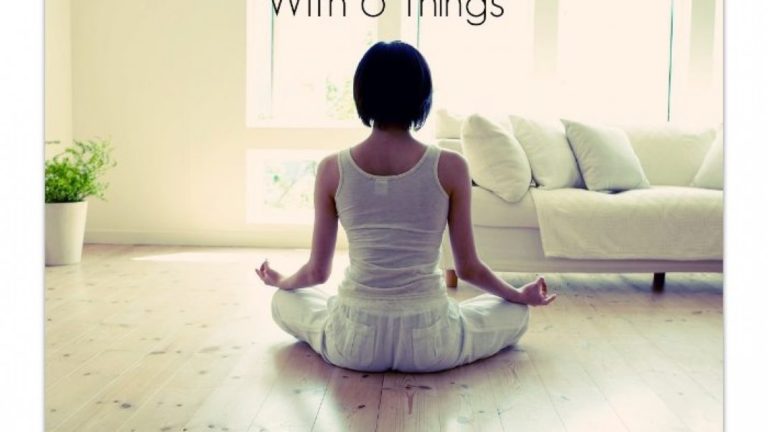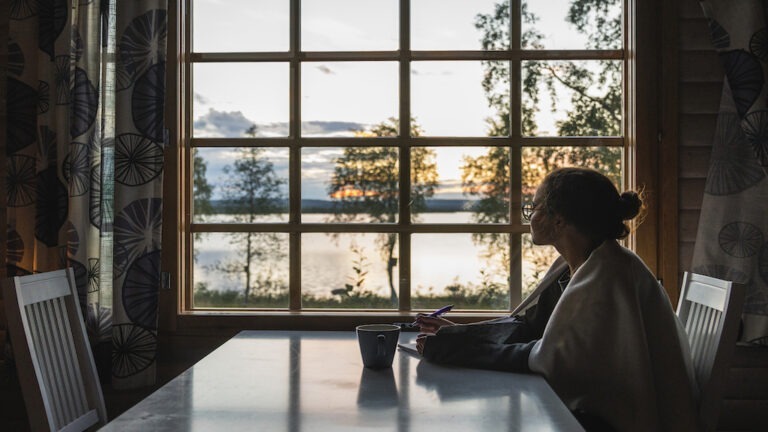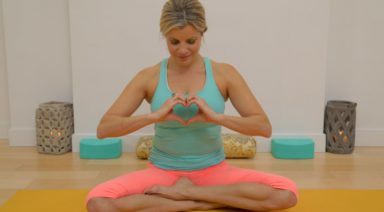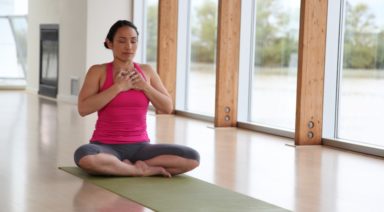These 6 things add serenity to any room in your house

We could all use a little more Zen in the place where we rest, recharge, and refocus: our homes! Now that you’ve detoxified your house, Feng Shui’d it up, and put it through the spring cleaning wringer, you can take a deep breath and find a little more peace in your home life with these tips, thanks to Oprah Magazine. The best part is that you can do these things in any room that you think could use more positive vibes, whether it’s your bedroom, your living room, or your dining room!
A Noise-Canceling…Rug
You probably never even noticed a spa’s greatest trick for creating a calming environment: “Soft fabrics, like mohair, help keep sounds from echoing,” says Stacy Shoemaker, editor-in-chief of Hospitality Design, which recognizes the world’s top hotels with its annual design awards. White sheepskin throws, rugs and covered pillows are especially popular right now: They’ve got all the plushness of a high-end fabric, but—starting at about $30 a piece—they won’t kill your budget.
An Odd Couple That Works Together
In a room with a mishmash of furniture bought, given and handed down, one of the easiest ways to keep things from looking jumbled is to figure out which pieces of furniture could work together—like a mirror and a chest that form a makeshift vanity—and paint them the same color, designer and The Nesting Place author Myquillyn Smith says.
A Signature Scent
Le Méridien commissioned a custom scent for its rooms, which smells a lot like leather-bound books. It’s familiar enough to comfort guests, and distinctive enough that they’ll associate it only with the hotel. Similarly, having a nontraditional scent that reminds you of your home—and only your home—can help you leave work, traffic jams and that rude woman at the grocery store behind as soon as you walk through the door.
A Bright Spot
Oh, to have gigantic windows and skylights. That may not be the reality for most of us, but with a few extra lamps—including an overhead light set to a dimmer switch—and boosting the lights so they’re brightest at mid-day, when the sun is at its brightest, could help you feel better (and create a home that looks like this). An October 2013 study in the Journal of Advanced Nursing found that hospital patients who were exposed to low levels of light 24 hours a day were more fatigued and reported higher pain levels than those who stayed in rooms with lights that adjusted. With just 40 people surveyed, there’s no guarantee that brighter days and darker evenings will improve your health, but it may be worth testing out for yourself.
A Glimmer of Warmth
While soft blues continue to be the most popular “peaceful” color, Zillow Digs’s Board of Designers survey found that a new shade has tied white for the number two spot: Gray. Unlike other calming colors, which tend to be cool tones, most people prefer light grays that have hints of red in them. Cool grays feel sterile, like an industrial warehouse, explains Jackie Jordan, director of color marketing at Sherwin-Williams. She recommends Mindful Gray or Anew Gray, and says she’s seeing them paired with pale aquas as an alternative to the classic blue and white.
Find Your Center
Start with the biggest piece of furniture in the room–that’s where your gaze will naturally rest. Flank it with two similar items, like a pair of side tables, wall art or lamps–but not pairs of all three, or you risk veering from symmetry to “sameness.” Because you’re going for serenity, not boredom.
The Three Questions With Don Miguel Ruiz

Everything we do is connected to an agreement we have made. This is the premise proposed by Don Miguel Ruiz, best-selling author, and renowned spiritual teacher. Ruiz has spent decades guiding people to personal freedom through his profound insights regarding the nature of human reality.
In “The Three Questions with Don Miguel Ruiz,” we get a glimpse of how we shape our own lives, consciously and unconsciously, through our interactions with others and the promises we make to them and ourselves. This discussion gives us pause to think about what we really know versus what we have learned from others.
The youngest of 13 children, Don Miguel Ruiz was born in rural Mexico to parents who practiced ancient Toltec traditions and used their healing abilities to uplift others. After graduating from medical school in Mexico City, Ruiz began practicing neurosurgery with his older brother in Tijuana.
Not long after, however, a near-fatal car accident completely altered his life’s course, leading him to leave his career in medicine in search of a more essential truth about life. With his mother’s guidance, steeped in traditional native teachings, he soon discovered his own path to awareness that evolved into a deep understanding of the physical universe and the virtual world of the mind.
Ruiz’s self-discovery led him to publish a number of highly successful books, including “Toltec Wisdom Series,” “The Four Agreements,” “The Mastery of Love,” “The Voice of Knowledge,” “The Four Agreements Companion Book,” “The Circle of Fire,” and “The Fifth Agreement.” The Toltec Wisdom books have sold more than 12 million copies, and have been published in 46 languages worldwide.
Don Miguel Ruiz’s message is simple yet profound: Our lives are guided and affected by information that is passed along generationally — right or wrong. But instead of simply adhering to the ideas of others, we need to “let everything we do and say be an expression of the beauty of our heart, always based on love,” and this will lead us to happiness, fulfillment, and helping others.





































